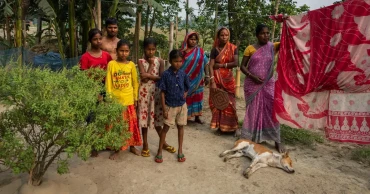Indian citizenship
No info on whether Hasina granted Indian citizenship: MoFA
The Ministry of Foreign Affairs on Thursday said they have no information whether former Prime Minister Sheikh Hasina has taken any Indian citizenship.
Spokesperson at the Ministry of Foreign Affairs Mohammad Rafiqul Alam came up with the remarks while responding to a question at the ministry’s weekly briefing.
He also said it is a matter to be considered by the Indian government on what status she is staying in India.
India extends Hasina’s visa amid Bangladesh’s extradition demand
The spokesperson also said Dhaka is waiting for India’s reply regarding Bangladesh’s new High Commissioner to India as Bangladesh sought agrimo (recognition).
“We are waiting for India’s reply. I don’t think it is taking more time than usual. There is no specific timeframe but usually it is by 3 to 4 months,” said the spokesperson.
Regarding the signed deals between Bangladesh and India, he said these all documents are already in the public domain.
Apparently referring to deposed Prime Minister Sheikh Hasina’s reported visa extension, the interim government recently said visa issue does not exist once passport is cancelled.
Earlier, the Department of Immigration and Passports revoked the passports of 97 people, including Hasina, due to their alleged involvement in the July killings and alleged involvement in enforced disappearances.
Hasina’s visa extension not taken positively by people: Rizvi
However, the Hindustan Times, a major national daily of India, reported that Hasina’s visa extension was recently approved, facilitated by India’s Union Home Ministry through the Foreigners Regional Registration Office (FRRO).
Hasina, 77, has been residing in India since fleeing her country in August last year, following widespread protests that culminated in her resignation.
The spokesperson also said they have not yet received a response to the letter (note verbale) sent to India requesting Hasina's extradition.
Hasina among 75 whose passports stripped over July killings
1 year ago
As India is set to become the most populous country, some struggle to prove they are Indians
Krishna Biswas is scared. Unable to prove his Indian citizenship, he is at risk of being sent to a detention center, far away from his modest hut built of bamboo wood that looks down on fields lush with corn.
Biswas says he was born in India’s northeastern Assam state. So was his father, almost 65 years ago. But the government says that to prove he is an Indian, he should furnish documents that date back to 1971.
For the 37-year-old vegetable seller, that means searching for a decades-old property deed or a birth certificate with an ancestor’s name on it.
Biswas has none, and he is not alone. There are nearly 2 million people like him — over 5% of Assam's population — staring at a future where they could be stripped of their citizenship if they are unable to prove they are Indian.
Questions over who is an Indian have long lingered over Assam, which many believe is overrun with immigrants from neighboring Bangladesh.
Also Read: Trouble looms for Indian grain that combats climate change
At a time when India is about to overtake China as the most populous country, these concerns are expected to heighten as Prime Minister Narendra Modi’s government seeks to use illegal immigration and fears of demographic shift for electoral gains in a nation where nationalist sentiments run deep.
The ruling Bharatiya Janata Party has promised to roll out a similar citizenship verification program nationwide even though the process in Assam has been put on hold after a federal audit found it flawed and full of errors.
Nonetheless, hundreds of suspected immigrants with voting rights in Assam have been arrested and sent to detention centers the government calls “transit camps.” Fearing arrest, thousands have fled to other Indian states. Some have died of suicide.
___
EDITOR’S NOTE: This story is part of an ongoing series exploring what it means for the 1.4 billion inhabitants of India to live in what will be the world’s most populated country.
___
Millions of people like Biswas, whose citizenship status is unclear, were born in India to parents who immigrated many decades ago. Many of them have voting cards and other identification, but the state’s citizenship registry counts only those who can prove, with documentary evidence, that they or their ancestors were Indian citizens before 1971, the year Bangladesh was born.
Modi’s party, which also rules Assam, argues the registry is essential to identify people who entered the country illegally in a state where ethnic passions run deep and anti-immigrant protests in the 1980s culminated in the massacre of more than 2,000 immigrant Muslims.
“My father and his brother were born here. We were born here. Our kids were also born here. We will die here but not leave this place,” Biswas, said on a recent afternoon at his home in Assam’s Murkata village, near the banks of the Brahmaputra River.
Also Read: India poised to become world’s most populous nation this week: UN
The Biswas family has 11 members, of whom the citizenship of nine is in dispute. His wife and mother have been declared Indian by a foreigners’ tribunal that decides on citizenship claims. Others, including his three children, his father and his brother’s family, have been declared “foreigners.”
It makes no sense to Biswas, who wonders why would some be considered to have settled in the country illegally and others not, even though they all were born in the same place.
The family, like many others, has not pleaded their case before the tribunal or higher courts due to a lack of money and the arduous paperwork required in the process.
“If we cannot be Indian then just kill us. Let them (the government) kill my whole family,” he said.
The registry was last updated in 2019 and excluded both Hindus and Muslims, but most critics view it as an attempt to deport millions of minority Muslims.
They say the process would become even more exclusionary if Modi’s party resurrects a controversial citizenship bill that grants citizenship to persecuted believers who entered India illegally from neighboring countries, including Hindus, Sikhs and Christians, but not Muslims. The nationwide citizenship bill was introduced in 2019, but led to widespread protests across India for singling out Muslims, forcing the government to put it on the backburner.
Supporters of the registry say it is essential to protect the cultural identity of Assam’s indigenous people, arguing that those who entered illegally are taking away their jobs and their land.
“The influx of illegal foreigners from Bangladesh is a threat to the identity of the indigenous people of Assam. We cannot stay like a second class citizen under illegal Bangladeshis. It is a question of our own existence,” said Samujjal Bhattacharya, who has been part of a movement in Assam against illegal immigration.
Fearing a possible loss of citizenship, scores of people in Assam have killed themselves, leaving a trail of devastation among families.
When Faizul Ali was sent to a detention center after being declared a “foreigner” in late 2015, his family members feared they would be next. The prospect of being thrown in jail drove his son to take his own life. His brother tried to save him but drowned in the process. A year later, Ali’s other son hanged himself.
Ali was released on bail from the detention center in 2019. He died in March, leaving behind his wife, a mentally ill son, two daughter-in-laws and their children. They all live in a single room house made of corrugated tin in Muslim majority Bahari village. All have been declared “foreigners.”
Unable to make ends meet, Ali’s wife, Sabur Bano, has taken to begging. She can’t afford firewood for cooking and uses discarded clothes she collects from streets as burning material.
“I am a citizen of this country. I am 60 years old. I was born here, my children were brought up here, all my belongings are here. But they made me a foreigner in my own land,” she said, wiping tears from the hem of her white sari.
Others are still waiting for their loved ones after they were arrested.
On a recent morning, Asiya Khatoon boarded a rickshaw and traveled nearly 31 kilometers (19 miles) from her home to a detention center in Assam's town where her husband has been held since January.
“They (police) just came and picked up my husband saying he is a Bangladeshi,” the 45-year-old said, before hurriedly walking toward the detention center circled by a vast perimeter of walls and watchtowers with security cameras and armed guards.
In her hands was a crinkled plastic bag. It carried a green T-shirt, trousers and a cap she wanted to give her husband.
2 years ago
Rape case accused arrested in Sylhet
A fugitive accused in a rape case has been arrested from Sreepur Tea Garden in Sylhet after he took Indian citizenship to escape sentence.
The arrestee was identified as Sujit Nomo Biswas, son of late Projes Biswas of Vitrikhel Guchhogram village of Jaintapur Upazila.
Read: Main accused in a Chandpur rape case evades arrest; 3 held
Golam Dastagir, officer-in-charge (OC) of Jaintapur Police Station, said Sujit was a fugitive accused in the rape case. He was trying to escape sentence with Indian citizenship.
On Tuesday, Sujit entered Bangladesh through the Sreepur Tea Garden border point as he did frequently. On information, police arrested him after confirming his identity, the OC said.
Read: 5-yr-old girl raped in Dinajpur: Man gets life imprisonment
Sujit was brought before the court on Wednesday, Dastagir added.
A rape case was filed against Sujit at Jaintapur Police Station in June 18, 2020. He escaped to India about one and half years ago and took shelter at his sister’s place. He changed his name as Roni Roy taking Indian citizenship with his sister’s help, he added.
4 years ago
India invites applications for citizenship from non-Muslim refugees from neighbouring countries
India on Friday invited non-Muslims like Hindus, Sikhs, Jains and Buddhists belonging to Afghanistan, Bangladesh and Pakistan and residing in 13 districts of Gujarat, Rajasthan, Chhattisgarh, Haryana and Punjab to apply for Indian citizenship.
According to a report of Hindustan Times, the Union home ministry issued a notification in this effect for immediate implementation of the order under the Citizenship Act 1955 and Rules framed under the law in 2009 even though the rules under the Citizenship Amendment Act (CAA) enacted in 2019 are yet to be framed by the government.
Read Bangladesh wants to begin initial transfer of Rohingyas to Bhasan Char: FS
"In exercise of powers conferred under Section 16 of the Citizenship Act, 1955 (57 of 1955), the central government hereby directs that powers exercisable by it for registration as citizen of India under Section 5, or for grant of certificate of naturalisation under section 6 of the Citizenship Act 1955 in respect of any person belonging to minority community in Afghanistan, Bangladesh and Pakistan namely, Hindus, Sikhs, Buddhists, Jains, Parsis and Christians, residing in the districts mentioned and the states mentioned below....," the notification said.
When the CAA was enacted in 2019, there were widespread protests in different parts of the country and even riots took place in Delhi in early 2020 in the wake of these protests.
Read Refugees: UN recognises generosity, humanity of host countries
According to the CAA, Indian citizenship will be given to non-Muslim persecuted minorities from Bangladesh, Pakistan and Afghanistan -- Hindu, Sikh, Jain, Buddhist, Parsi and Christian -- who had come to India till December 31, 2014.
4 years ago






